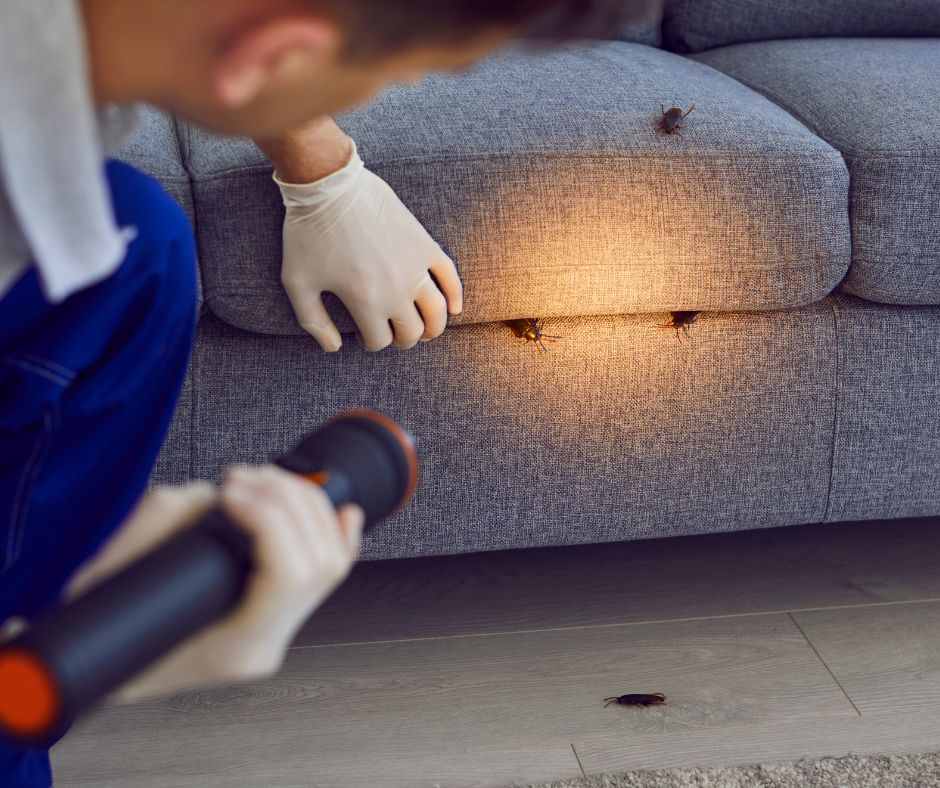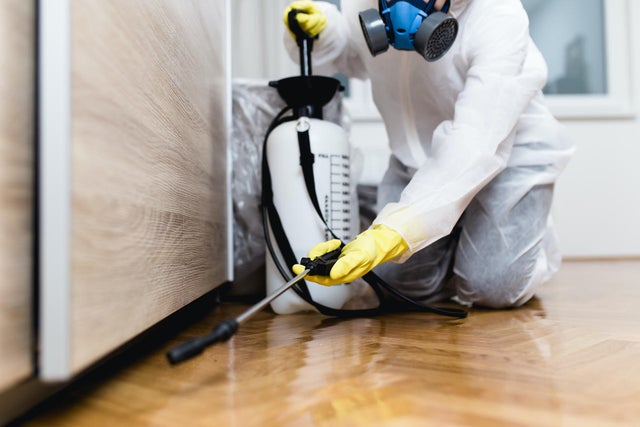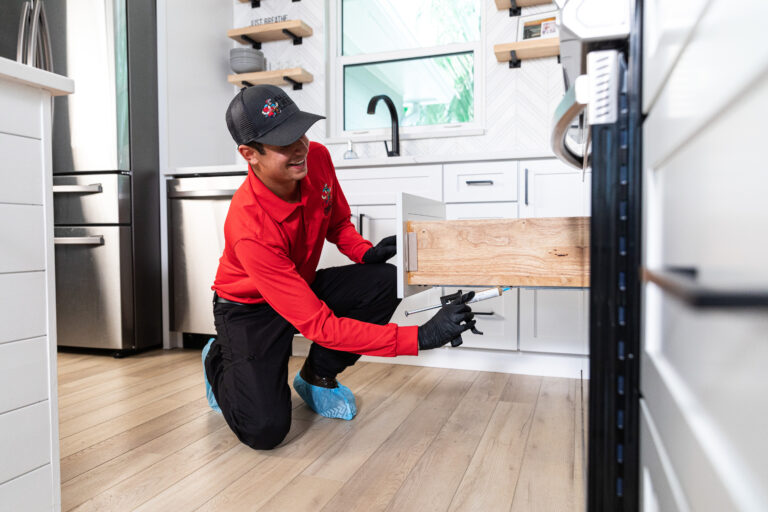Why Pest Control in Charlotte County Is Essential for Your Property’s Health
Why Pest Control in Charlotte County Is Essential for Your Property’s Health
Blog Article
Learn Concerning the most up to date Developments in Pest Control and How to Execute Efficient Therapy Solutions
In recent times, the field of insect control has experienced substantial improvements, driven by the need for sustainable and effective treatment solutions. Ingenious methods such as Integrated Bug Administration (IPM) integrate environment-friendly exercise with innovative technology, improving both effectiveness and ecological duty. Furthermore, the integration of wise innovations and DIY methods has equipped people to take on bug problems better. As we discover these advancements, it becomes necessary to understand how ideal to implement these strategies in numerous settings to achieve ideal results. The implications for parasite administration practices can be transformative.
Eco-Friendly Parasite Control Options
Over the last few years, the need for environment-friendly insect control alternatives has risen as property owners and companies alike look for sustainable options to typical chemical therapies. This shift is driven by expanding environmental awareness and a wish to reduce the health and wellness threats connected with synthetic pesticides.

Eco-friendly parasite control techniques incorporate a series of techniques that focus on the usage of natural compounds and methods. Integrated Pest Monitoring (IPM) is one such technique, integrating biological, social, and mechanical strategies to take care of parasite populaces while minimizing dependence on chemicals (Wildlife removal services). This all natural method emphasizes avoidance with habitat manipulation and the intro of natural killers, thus cultivating a well balanced ecosystem
Another prominent choice is using herb pesticides stemmed from plants, which have a tendency to be much less harmful to non-target organisms. Products like neem oil and diatomaceous planet have gotten traction for their efficiency in controlling parasites while positioning marginal risks to human health and wellness and the environment.
Additionally, exemption techniques, such as sealing access points and preserving tidiness, play an essential duty in environmentally friendly bug monitoring. By adopting these sustainable methods, companies and people can properly take care of bugs while advertising a healthier planet for future generations.
Smart Innovation in Parasite Management
Technology is improving the landscape of pest management, with wise innovation emerging as a critical pressure in boosting effectiveness and efficiency - Wildlife removal services. The combination of Net of Points (IoT) devices, artificial knowledge (AI), and information analytics is changing just how pest control experts approach invasions
Smart traps geared up with sensors can discover insect task in real-time, sending out prompt signals to drivers. This enables prompt actions, lessening damage and decreasing the need for extensive treatments. In addition, AI formulas examine historical data to forecast parasite habits, allowing proactive interventions based upon environmental conditions and infestation patterns.
Drones and computerized cars are additionally playing a significant duty in parasite administration, offering aerial evaluations of big areas, recognizing hotspots, and also distributing targeted therapies. These modern technologies not just enhance operations yet likewise enhance security by restricting human exposure to possibly damaging chemicals.
Moreover, mobile applications empower consumers to monitor insect activity and gain access to expert suggestions, promoting a collaborative strategy to pest administration. Overall, the fostering of wise modern technology is setting a brand-new requirement in parasite control, stressing data-driven decisions and sustainable techniques that eventually profit both home owners and experts alike.
Integrated Parasite Management Approaches
Integrated Bug Management (IPM) utilizes a holistic method to pest control, incorporating various approaches to efficiently handle parasite populations while decreasing dangers to human wellness and the environment. IPM focuses on comprehending the pest life process, their natural adversaries, and the ecosystem in which they flourish.
One of the basic parts of IPM is keeping track of pest populations via regular evaluations and information collection. This enables the recognition of pest thresholds, figuring out when treatment is essential. Social techniques, such as crop rotation, habitat, and cleanliness manipulation, are important in minimizing bug occurrence and promoting plant health and wellness.
Mechanical controls, consisting of catches and barriers, are also crucial in IPM. These methods can physically remove or prevent bugs without using chemicals. When necessary, the sensible application of chemical controls is employed, focusing on targeted treatments that minimize ecological impact.
Education and learning and partnership amongst stakeholders, including farmers, insect control professionals, and the neighborhood, are crucial for the effective execution of IPM methods. By prioritizing sustainable techniques, IPM not just addresses pest problems however also cultivates a much healthier ecological community.
Biological Control Methods
Countless biological control techniques are progressively recognized for their efficiency in handling insect populaces while promoting ecological equilibrium. These methods harness all-natural predators, bloodsuckers, and microorganisms to reduce pest numbers without depending on synthetic chemicals. For example, the intro of ladybugs can efficiently regulate aphid populations, while nematodes target soil-dwelling pest larvae.
Additionally, the usage of microbial pesticides, such as Bacillus thuringiensis (Bt), offers an ecologically pleasant alternative for taking care of caterpillar pests. These items particularly target pest types, reducing harm to valuable pests and pollinators. Moreover, conservation organic control emphasizes enhancing environments for all-natural enemies, such as birds and valuable bugs, thus urging their presence in agricultural systems.
Study proceeds to reveal ingenious strategies within this field, such as gopher control the use of pheromones to interfere with pest breeding patterns or the growth of biocontrol agents with genetic modification. Applying these methods can lead to sustainable insect administration practices that minimize the dependence on chemical interventions, eventually cultivating healthier communities. As recognition of these strategies expands, they are becoming indispensable components of incorporated pest management (IPM) strategies, providing a balance between effective insect control and environmental stewardship.
DIY Bug Control Solutions
As home owners look for reliable methods to deal with insect issues, DIY insect control services have gained appeal for their pestman pest control accessibility and cost-effectiveness. These approaches encourage people to attend to invasions using readily offered products and methods, commonly without the requirement for professional treatment.

Additionally, maintaining correct hygiene and normal examinations can stop bug access and nesting (Wildlife removal services). Basic methods, such as sealing cracks, getting rid of food resources, and decluttering, can substantially diminish pest populaces. Catches, both homemade and commercially available, can also offer effective remedies for tracking and controlling specific parasites like insects or rats

Conclusion
The assimilation of environmentally friendly pest control options, clever technology, and cutting-edge management methods presents a detailed approach to efficient pest administration. By welcoming Integrated Insect Monitoring (IPM) and utilizing biological control methods, together with Do it yourself solutions, responsible and sustainable bug control can be achieved.
Environment-friendly parasite control methods include an array of strategies that prioritize the use of all-natural substances and look at this web-site methods. Integrated Insect Management (IPM) is one such technique, combining biological, social, and mechanical techniques to take care of insect populaces while lowering reliance on chemicals. As recognition of these methods grows, they are coming to be indispensable components of integrated insect administration (IPM) methods, supplying an equilibrium between effective bug control and ecological stewardship.
The combination of green parasite control alternatives, clever technology, and innovative management strategies presents a comprehensive approach to effective pest management. By embracing Integrated Pest Management (IPM) and making use of organic control approaches, together with DIY services, sustainable and responsible parasite control can be accomplished.
Report this page